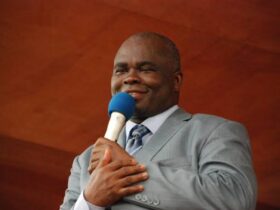
Amidst economic challenges in, Lagos State Governor, Babajide Sanwo-Olu has unveiled plans to distribute palliatives and initiate programs aimed at alleviating the impact of the high cost of living.
In a live media chat with journalists on Thursday, the governor outlined various measures to support residents facing economic hardship.
As part of the relief efforts, Governor Sanwo-Olu announced the imminent arrival of over 200 trailers loaded with essential food items, primarily rice, from northern Nigeria. These provisions are intended to benefit approximately 300,000 households and will include items such as rice, garri, beans, and tomatoes.
READ MORE: JUST IN: Nigerian Army Squashes Coup Rumors, Labels Report as ‘FAKE NEWS’
Furthermore, the governor revealed plans to introduce “Sunday Markets” across 42 locations in Lagos, where residents can purchase food items at discounted rates. Governor Sanwo-Olu stated, “We are going to be opening ‘Sunday Markets’ in about 42 markets in Lagos. This time you’ll be buying at a reduced cost. We’re going to cap what you can buy at not more than N25,000 and we’re going to be giving you a 25% rebate immediately there.”
In addition to discounted markets, the state government aims to support small-scale food vendors, commonly known as “Mama Put” businesses, by initiating the “Soup Bowl” program. Under this initiative, the government plans to identify and collaborate with caterers to provide meals to between 1,000 and 1,500 individuals in each local government area daily.
Governor Sanwo-Olu emphasized the importance of addressing the needs of vulnerable residents, stating, “Somebody that wants to buy N10,000, N15,000, which are the people that we want to take out from poverty, we will give you an immediate discount of about 25 percent.”
In addition to these measures, the state government announced adjustments to the work schedule for public servants. Beginning next week, lower-level civil servants will work for three days a week, while senior-level employees will work for four days, as part of efforts to optimize productivity and efficiency.
Despite these initiatives, concerns have been raised about the necessity for such programs in a state with a reported internally generated revenue (IGR) of over N600 billion. Critics argue that the reliance on palliatives and soup kitchens reflects systemic issues within the state’s economy and governance.
Governor Sanwo-Olu’s announcement comes amidst growing economic challenges across Nigeria, exacerbated by factors such as inflation, unemployment, and the lingering effects of the COVID-19 pandemic. As residents grapple with rising living costs, the effectiveness of these relief measures remains to be seen, with calls for sustainable economic policies and long-term solutions to address underlying issues of poverty and inequality.









Leave a Reply